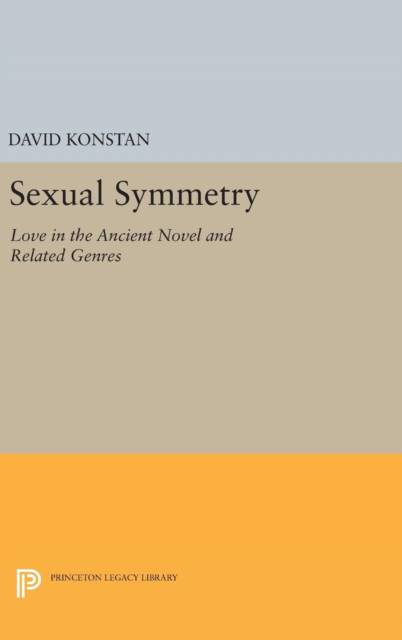
- Retrait gratuit dans votre magasin Club
- 7.000.000 titres dans notre catalogue
- Payer en toute sécurité
- Toujours un magasin près de chez vous
- Retrait gratuit dans votre magasin Club
- 7.000.0000 titres dans notre catalogue
- Payer en toute sécurité
- Toujours un magasin près de chez vous
Description
"In the Greek romances," writes David Konstan, "sighs, tears, and suicide attempts are as characteristic of the male as of the female in distress; ruses, disguises, and outright violence in defense of one's chastity are as much the part of the female as of the male." Exploring how erotic love is represented in ancient amatory literature, Konstan points to the symmetry in the passion of the hero and heroine as a unique feature of the Greek novel: they fall mutually in love, they are of approximately the same age and social class, and their reciprocal attachment ends in marriage. He shows how the plots of the novels are perfectly adapted to expressing this symmetry and how, because of their structure, they differ from classical epic, elegy, comedy, tragedy, and other genres, including modern novels ranging from Sidney to Harlequin romances.
Using works like Chaereas and Callirhoe and Daphnis and Chloe, Konstan examines such issues as pederasty, the role of eros in both marital and nonmarital love, and the ancient Greek concept of fidelity. He reveals how the novelistic formula of sexual symmetry reverses the pattern of all other ancient genres, where erotic desire appears one-sided and unequal and is often viewed as either a weakness or an aggressive, conquering power. Konstan's approach draws upon theories concerning the nature of sexuality in the ancient world, reflected in the work of Michel Foucault, David Halperin, and John Winkler. Originally published in 1993. The Princeton Legacy Library uses the latest print-on-demand technology to again make available previously out-of-print books from the distinguished backlist of Princeton University Press. These editions preserve the original texts of these important books while presenting them in durable paperback and hardcover editions. The goal of the Princeton Legacy Library is to vastly increase access to the rich scholarly heritage found in the thousands of books published by Princeton University Press since its founding in 1905.Spécifications
Parties prenantes
- Auteur(s) :
- Editeur:
Contenu
- Nombre de pages :
- 286
- Langue:
- Anglais
- Collection :
- Tome:
- n° 272
Caractéristiques
- EAN:
- 9780691634876
- Date de parution :
- 19-04-16
- Format:
- Livre relié
- Format numérique:
- Genaaid
- Dimensions :
- 156 mm x 234 mm
- Poids :
- 576 g

Les avis
Nous publions uniquement les avis qui respectent les conditions requises. Consultez nos conditions pour les avis.






